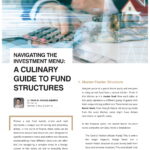To read or download the article, please click the following link
In the ever-evolving global financial landscape, Private Equity Funds (PE Funds) have become a potent investment tool. These funds, like silent partners, inject capital into promising young companies, aiming to reap returns through strategic acquisitions, investments, and eventually, the sale of equity stakes. While the inherent risk of PE investments may raise eyebrows, the potential for high-yield returns and exponential growth often trumps concerns. The worldwide PE market has seen an incredible expansion, fueled by both ambitious investors and enterprises seeking alternative financing solutions, and Vietnam is no exception.
This vibrant Southeast Asian nation, with its tech-savvy population and burgeoning entrepreneurial spirit, has seen the emergence of a diverse landscape of small and medium-sized enterprises (SMEs). These young businesses, brimming with enthusiasm and creativity, are the backbone of Vietnam’s economic development. However, their lack of capital often hinders their growth potential. This is where the PE market steps in, bridging the gap between ambitious dreams and financial realities.
1. The PEs
Unlike regulated ventures like stock investment funds, PE Funds are commonly established and operated under the general umbrella of corporate law. This means no specific license or stringent securities regulations apply, offering a seemingly smoother path. While foreign investors can participate in PE activities, establishing or having a majority share in Vietnamese private equity funds involves various legal challenges, such as:
- Governmental Approval: Obtaining an Investment Registration Certificate (IRC) or approval for capital contributions, share purchases, or acquisitions becomes mandatory for foreign investors entering the Vietnamese PE market.
- Antitrust Measures: When PE deals reach a certain threshold, both the PE fund and the target company must notify the National Competition Commission. This applies, for instance, if a PE fund acquires all shares or a controlling stake in a target company valued above 1,000 billion VND.
- Tax Complexities: While PE business profits derived from share transfers or contributed capital are taxed at a flat 20%, the road to determining taxable profits can be intricate. Tax authorities may hold different perspectives and stipulations regarding transfer prices, especially when they deviate from market value or recorded book value.
2. The Targets
In the fast-paced world of Vietnamese PE market, putting together the correct deal structure is critical. Whether it’s a tech startup or a seasoned manufacturer, each target company necessitates a tailored approach, addressing challenges from investment to divestment.
Building the Foundation: Share subscription agreements (SSA) and share purchase agreements (SPA) form the backbone of PE transactions in Vietnam. These agreements typically involve PE funds acquiring an initial minority stake in the target company, often paired with an option to purchase additional shares later on, unlocking greater control and influence as the partnership evolves.
Navigating Complexities: When circumstances demand more intricate solutions, instruments like convertible loans and preference shares come into play. These structures offer greater flexibility and control for the PE fund, allowing them to convert debt into equity or receive preferential dividends. Special purpose vehicles (SPVs) can further enhance efficiency by optimizing taxes and adding a layer of legal separation.
Joining Forces: For foreign PE Funds traversing Vietnam’s restricted industries, cooperating with domestic counterparts through partnership agreements or establishing joint ventures is critical. This collaboration opens up access to previously unexplored markets and uses both sides’ expertise, resulting in a synergistic force for growth.
While Vietnam’s booming economy offers numerous prospects, navigating the country’s legal system and administrative landscape demands careful planning. By developing well-defined business strategies, seeking expert legal counsel, and meticulously crafting transaction structures, PE Funds can navigate the Vietnamese market with confidence, minimizing risks and maximizing their potential for success.







